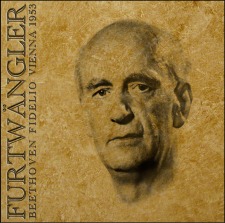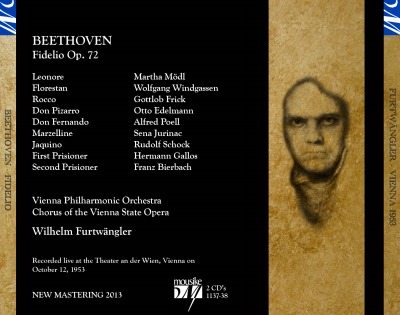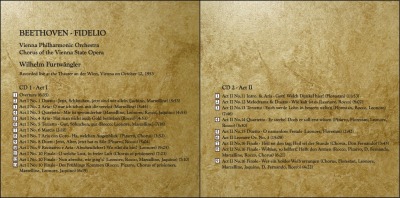 | Beethoven Fidelio Martha Mödl, Wolfgang Windgassen, Gottlob Frick, Otto Edelmann, Sena Jurinac, Rudolf Schock Vienna Philharmonic Orchestra - Vienna 1953 $14 | |||
Comparing with the EMI recording, there is a substantial difference in intensity, what one usually gets with Furtwängler conducting live. That is a good reason to have this performance.
Comparing this performance with the one from Salzburg 1950 is perhaps an even more interesting endeavor. Which one is preferred will very much depend on what you want in a Fidelio. The two interpretations are very different indeed. In the text I wrote for the Salzburg Fidelio, I included a quote from Furtwängler himself from the late 40's which said, among other things that ". Fidelio is not an opera in the sense we are used to, nor is Beethoven a musician of the theater, or a dramaturgist." In the Salzburg performance we did not hear an "opera in the sense that we are used to" but rather what I would call a hymn to liberty. I have argued in favor of that interpretation many times, saying that I prefer a great hymn to liberty than a mediocre opera. However, I know from experience that many people want the opera. Well, you can have it in this 1953 performance.
In this performance, the focus shifts from the cosmic and heroic to the human. Here, the characters are very much human. Perhaps the clearest example of this is to compare the two Leonores. While Flagstad's interpretation is mythical, expressing the ideals and values of the character, Mödl's interpretation very human, expressing eloquently her feelings and the drama of her predicament. The same can be said of the Florestan of Patzak vs. the one from Windgassen. Some will like Flagstad and Patzak while others will prefer Mödl and Windgassen. I confess that I prefer the Salzburg. But that is only me.
Another issue is trying to understand why it was that Furtw?ngler changed. I have always thought that he weakened after 1950. Surely there were some great interpretations after this date, but the heroic intensity began to fade. Sometimes, physical reasons have been put forward to explain this, such as age and his growing deafness. However, the difference between these two Fidelios can give us a clue in a different direction. The shift from the mythically heroic to the "all too human" is typical of a process of decadence in civilizations as well as people. I believe that his disappointment with the values of post-war Europe led to a loss of ideals and to this decadence.
 |
 |